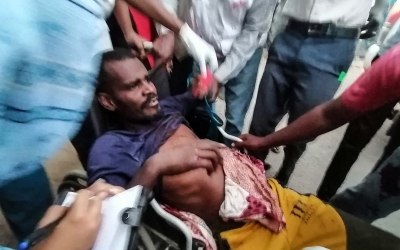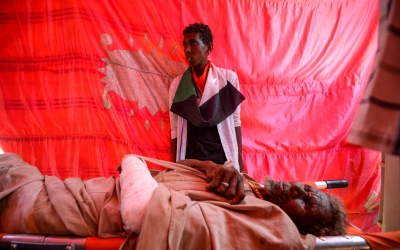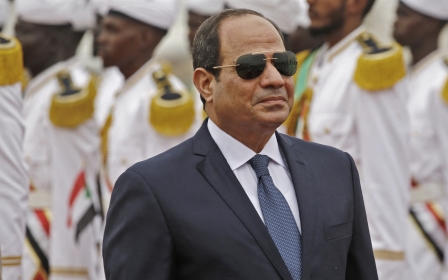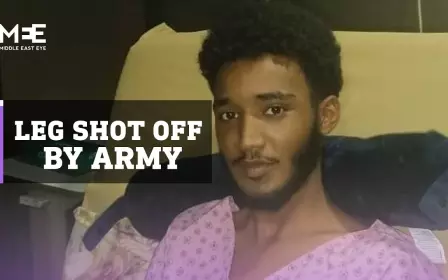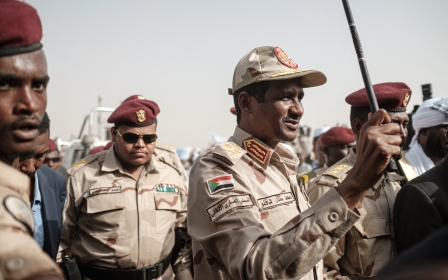Sudan protesters and security forces resort to new tactics
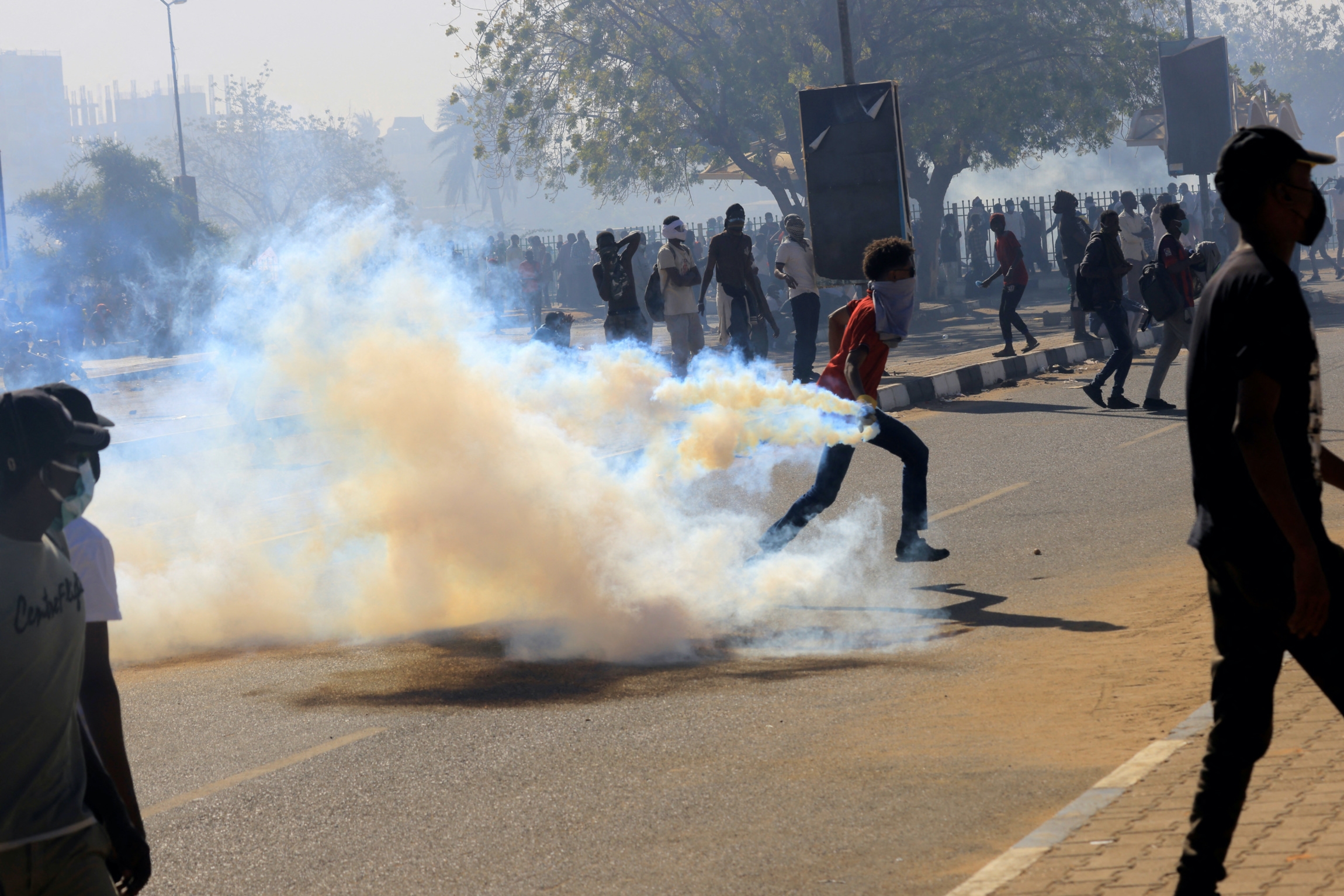
Near al-Joda hospital in Aldaim district in Sudan's capital, Khartoum, thousands of protesters on 30 December formed a human barricade to block roads in front of police and security vehicles to prevent them from reaching the building, where dozens of those wounded during recent protests were being given medical treatment.
Other protesters parked their cars in the middle of the road, leaving a narrow path for the motorbikes transporting the wounded to the hospital.
New tactics like these have been honed over the three-year struggle for democracy in Sudan and are now being used by protesters as they confront security forces and protest against last year's October military coup that upended a two-year transition to civilian rule.
Recent street confrontations have seen both sides using new street tactics to attack, evade, and immobilise the other.
Security forces have been closing roads with large containers, barbed wire and cement blast-walls, and attacking protesters with dirty water among other violent means, while demonstrators have been countering with their own manoeuvres, including training on how to throw back teargas canisters.
New MEE newsletter: Jerusalem Dispatch
Sign up to get the latest insights and analysis on Israel-Palestine, alongside Turkey Unpacked and other MEE newsletters
Protecting the wounded
As security forces increasingly attack hospitals, ambulances, and street clinics in order to prevent civilians from receiving treatment, protesters have moved to protect medical centres, with what have been some of the simplest but sometimes effective ways to challenge the unprecedented violence by the police and the paramilitary Rapid Support Forces (RSF).
Standing outside al-Joda hospital, field committee member Musab Ahmed told Middle East Eye that protesters have been closing the roads leading to the hospital to protect it and the medical staff, and to enable the wounded to be treated.
"We have all seen the violence, including raids, used by security forces against hospitals in different districts, especially Omdurman [Khartoum's twin city across the Nile], so we are proud that our people are protecting them against these barbaric attacks," he said.
Thousands of people protested on Thursday 29 December around the presidential palace in Khartoum, despite the violent crackdown, cuts to the internet and phone networks, the closure of main roads and bridges, and the heavy deployment of troops.
The Central Committee of the Sudanese Doctors said that at least five protesters were killed and dozens wounded in Omdurman as the resistance committees called for another million-man march.
Medical sources confirmed to MEE that security forces stormed the 40th Street clinic in Omdurman on Thursday and an ambulance was seized while carrying wounded protesters.
Security forces also raided the offices of regional and international news organisations, including Al Arabiya, Skynews, and El Sharq, the Sudanese Journalists Network said in a statement on Thursday.
An Al Arabiya journalist told MEE that security forces had attacked journalists and cameramen at their office, and the channel broadcast a video showing some of the wounded staff.
Presenters at Skynews and El Sharq were prevented from showing live news.
Thousands of people also protested in other cities, including Port Sudan, Medani, and Atbara.
Tactics and counter-tactics
In addition to cutting off the internet and phone networks, including calls from abroad, the military has closed off main roads and bridges using big containers, a tactic it has not used before.
Security and RSF vehicles have also been used for road closures and to prevent protesters from moving from one place to another.
'We have all seen the violence… against hospitals… so we are proud that our people are protecting them against these barbaric attacks'
- Musab Ahmed, resistance committee
Meanwhile, protesters have also resorted to blocking streets using barricades, and have been confronting security forces by hurling back teargas canisters and navigating road closures by finding new and unexpected routes to move around.
A resistance committee member told MEE that they are creating new tactics to break the tough measures taken by the security forces, especially around police stations, including preventing their cars from moving around the city and mobilising people and directing them to protests without using the internet.
"We insist on bringing down this regime, and we will win in the end," he said on condition of anonymity for security reasons.
"These forces are not stronger than the regime of [deposed ruler Omar] al-Bashir that we brought down [in April 2019], so as they escalate their violence, we are also using simple and peaceful tactics that are painful for the security.
"We will go back to the night protests that we used against Bashir's regime in order to exhaust them."
Radical groups have also recently appeared among resistance committees. Operating under the names of the "Kings of Clashes" and "The Angry," these groups confront security forces and attempt to neutralise their weapons.
A member of the Kings of Clashes told MEE that the group has lost many members, some of whom are missing with no information on their whereabouts.
"We have been using some materials to protect ourselves from the effects of teargas, which has enabled us to better confront police and security forces and throw the canisters back at them. That's very painful for them," he said.
"We're also using motorbikes to break the road closures and let people move around, evacuate the wounded, and escape the forces."
In another tactic, he said, group members also move swiftly towards security forces and position themselves near them, since close proximity can deter them from using their weapons on the protesters for fear of hitting one of their own.
A human rights activist said that the violence used on Thursday "was unprecedented," which he sees as a sign that the leadership has begun losing control over its forces on the ground.
"The violence, including the killing, attacks on the press, and the intimidation of protesters, has been intense," he said, asking for anonymity.
"These videos that the world has seen are massive violations of the basic rights of the people, which will lead to action and sanctions against the coup leaders very soon."
Middle East Eye delivers independent and unrivalled coverage and analysis of the Middle East, North Africa and beyond. To learn more about republishing this content and the associated fees, please fill out this form. More about MEE can be found here.


